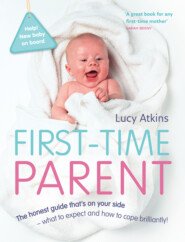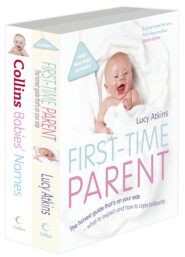По всем вопросам обращайтесь на: info@litportal.ru
(©) 2003-2024.
✖
Blooming Birth: How to get the pregnancy and birth you want
Настройки чтения
Размер шрифта
Высота строк
Поля
4 Modify your current fitness plan as your girth increases. As your pregnancy progresses, you’ll reach your maximum heart rate faster and your centre of gravity will change. Don’t abandon your workout entirely (a recumbent bike or treadmill might replace an aerobics class for instance). And try not to be results oriented – remember you are not trying to achieve anything (except basic well-being) during pregnancy.
5 Drink water. Most pregnant women don’t drink enough anyway and exercise makes this worse. Dehydration can lead to blood clots, and can also restrict the oxygen supply to your baby.
6 Use common sense. Some contact sports carry certain relatively minor risks. A severe blow to the abdomen, while unlikely, could damage the baby or cause you to miscarry. Ask your doctor if you are uncertain about the advisability of your chosen sport.
7 Listen to your body. If you have aches and pains, modify what you’re doing quickly or stop and try something else.
Reasons to be extra cautious
A history of miscarriage – particularly in the second trimester – certain conditions like ‘placenta praevia’, where the placenta is over the neck of the womb, or an ‘incompetent cervix’, where the neck of the womb is weak, can all be reasons to be cautious. If your baby is not growing well, or if you are carrying twins (or more) you may also need to take it slow. As always, talk to your midwife or doctor if there are any concerns.
Danger signs: Stop, and tell your midwife or doctor if you have any unexplained bleeding, dizziness, heart palpitations, blurred vision, sharp pains in abdomen or chest, or contractions during exercise.
Impact tip:
If you’re exercising at home (to a video, say) do so on a relatively soft surface, such as a yoga mat, to minimize the impact on your joints.
Falling down/being bumped in the belly: almost always the baby is fine when this happens. If, however, you feel the baby is moving less, or you are worried about pain or concussion, call your doctor/midwife.
PREGNANCY FITNESS
Specific forms of exercise
If you’re doing a specific form of exercise already, it may be perfectly safe to continue though modifying it as the pregnancy progresses. But always discuss your exercise routine with your doctor as your pregnancy may have issues of its own that rule some things out.
Spinning This can be great, but as your pregnancy progresses move from standing to sitting and don’t crank up the knob up as much as you did. Talk to your doctor about maximum heart rates.
Running Follow rules on intensity, watch the surface you are running on (not too hard or uneven) and beware your changing centre of gravity. If it hurts or feels uncomfortable, slow down. Walking may feel better.
Weight training This should be fine if you did it before you were pregnant but you’ll need to drop some weights as the pregnancy progresses (you’re carrying weight already, don’t forget). Avoid exercises that involve lying on your back after 12 weeks. Weightlifting with a partner who is looking out for you will keep your back straight and be another set of eyes keeping you safe. Always discuss your particular programme with your doctor.
Aerobics As with any class, let your instructor know as soon as you know you are pregnant. Slow down, avoid high impact moves and watch your heart rate. If it starts to hurt, or you get any other danger signs, stop.
Yoga Yoga is terrific in pregnancy. Drink lots of water and stop if you feel at all faint. If it’s not specific antenatal yoga, tell your instructor you are pregnant.
Pilates Great for pregnant women as long as you’ve got an experienced teacher. Most instructors will say it’s not a good idea to begin Pilates when pregnant, but if you’ve done it before, it can help you stay toned in pregnancy, and bounce back more quickly. According to Jenny Miller, a certified Pilates instructor and mother of two: ‘Pilates increases bone density, focuses on the ever-changing centre of gravity of a pregnant body and strengthens and maintains the muscles that support the growing belly.’
Sports generally
A bad fall or strong impact to the belly – rather than your average bump against a chair, tumble or kick from a toddler – could harm the baby so make sure you’ve really thought through the risks and talk to your doctor before you continue.
A WORD ABOUT INSTRUCTION | Make sure the instructor is really knowledgeable and not just giving you her best guess. And always talk to your doctor about the specifics of your exercise programme first. Pilates instructor Jenny Miller says: ‘In pregnancy the goals change from no limits to set limits. A good trainer will respect those limits. When a non-pregnant woman tells me she can’t do a position, I may urge her to push through her pain and tiredness. When a pregnant woman says the same thing I back off entirely and we rest.’ That’s the major difference with pregnant workouts: don’t push through the pain – stop!
Tip for fitness fiends:
‘See pregnancy for the temporary condition it is. If you are involved in an extreme sport or high impact fitness programme, consider doing something less risky for the few months you are pregnant.’ Tiffany Lipelt, fitness fanatic and mother of two.
Online:
Start with the Guild of Pregnancy and Postnatal exercise teachers www.postnatalexercise.co.uk (click on ‘information for mothers’) for basic information, book and video recommendations and ways to find a qualified teacher.
Further reading:
The Pregnancy Exercise Book by Judy Difiore (Newleaf, UK, 2000) A good basic book.
Exercising Through Your Pregnancy by James F. Clapp (Addicus, US, 2002) One for the exercise enthusiast.
Yoga for Pregnancy, Birth and Beyond by Francoise Barbira Freedman (Dorling Kindersley, UK, 2004)
Preparing for Birth with Yoga: Empowering and Effective Exercise for Pregnancy and Childbirth by Janet Balaskas (Harper Collins, UK, 2003)
It could happen: specific pregnancy fears and what to do about them
Miscarriage
A survey carried out by The Miscarriage Association found that nearly half the women who miscarried said they didn’t feel well informed about what was happening to them. Only 29 per cent felt well cared for emotionally. Many women who miscarry say books provided little or no information about it in advance. Many feel grief, depression, sadness, anger and loneliness after a miscarriage. This is why we’re giving you some basic facts about miscarriage. It does not mean you should expect to have one. But it may help you to cope if you do (and also to be sensitive to women you know who have had one).
MISCARRIAGE: SOME BASIC FACTS
More than one in five pregnancies end in miscarriage.
Most women only miscarry once.
Most miscarriages happen in the first 12 weeks of pregnancy, usually in the first eight weeks.
Even when a baby stops developing at six or eight weeks, it may take some time before the physical process of miscarriage starts.
Late miscarriage, where the baby stops developing after 12 weeks, is rare – it happens in about 2 per cent of pregnancies.
The risk of miscarriage increases with the mother’s age, with the greatest change after the age of 39.
If you miscarry once, your chance of having a second miscarriage is not significantly greater than in your first pregnancy.
Even women who have had five or more miscarriages will usually have a baby eventually.
Smoking in pregnancy has been linked to an increased chance of miscarriage.
Many women feel bereft following a miscarriage, and say that they feel misunderstood and hurt when people say, ‘Oh, you’ll be fine next time’ or ‘It’s nature’s way’ or ‘At least you already have one child’. Many miscarriages are unexplained – indeed, about half of us never find out exactly why we miscarried. About half of all early miscarriages happen because of chance chromosome abnormalities, and there are certain hormonal and physical conditions that can lead to miscarriage. Often, in the absence of a medical explanation, we blame ourselves. While this is tempting and horribly common, it is usually completely unfounded.
WHAT IS A MISCARRIAGE LIKE? | What happens in a miscarriage can vary hugely from woman to woman and depends on how many weeks pregnant you are. Many women have heavy bleeding and cramps or even just blood spotting when miscarrying. Some describe it as being like a ‘heavy period’, others say their miscarriage was much more painful, and very shocking. Some women, however, have no symptoms at all and are appalled to discover during a routine scan that the baby has no heartbeat.
On a reassuring note: if you get blood spotting do not assume you’re miscarrying. About 20 per cent of pregnant women have blood spotting in early pregnancy (I had it in all three of my pregnancies with no miscarriages). It’s also tempting to worry if you feel a cramp or ache in your belly in early pregnancy. But cramps/aches/pains in the lower abdomen are a normal part of pregnancy (remember: your ligaments are stretching, your organs remodelling themselves around your swelling womb). Don’t assume you are miscarrying if you get these symptoms. Do, however, call your doctor/midwife if you are at all concerned, and definitely call if you are spotting and cramping.
In some miscarriages, the womb empties itself completely. If not, you may be offered an operation (called an ‘ERPC’ or a ‘D&C’) or treatment with pills to empty your womb. You can, however, choose to wait and let the miscarriage happen naturally. Discuss this with your doctor.
PAST MISCARRIAGE | If you’ve miscarried in the past, early pregnancy can be one long anxiety-fuelled nightmare. ‘Every time I go to the loo I am waiting to see blood in my knickers,’ says Sophie, who had four miscarriages before her son Jack’s birth, has had one since and is pregnant again: ‘Every time I get a twinge in my belly my heart plummets. Every scan or checkup I worry there won’t be a heartbeat. I won’t discuss baby names and with Jack I did not buy any baby equipment until a week before he was due. I have to protect myself, and this is how.’ Some women wrap themselves in cotton wool, fearing that doing anything will spark a miscarriage.
WAYS OF COPING WITH A MISCARRIAGE







